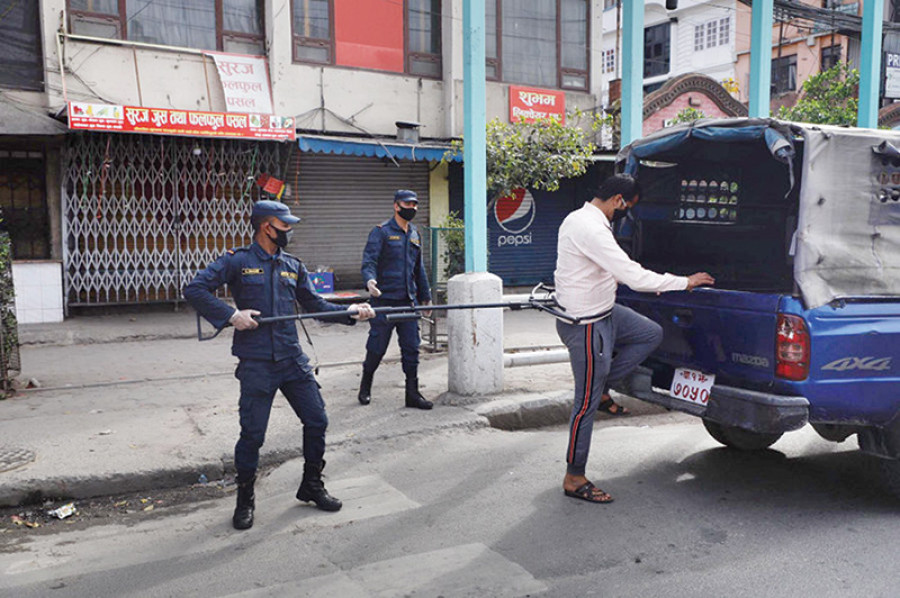Valley
Valley authorities to punish Covid-19 rule flouters
But they are not sure what exactly the punishment entails for violating the mask and social distancing requirements.
Anup Ojha
After a resurgence in Covid-19 cases in India, the Nepal government this week rang two alert bells. On Sunday, the Ministry of Health and Population urged the public to remain vigilant, and on Monday evening it asked the public not to organise gatherings and formal events.
The circular from the ministry stated that those who didn’t follow health protocols such as wearing masks or maintaining physical distance would be punished as per the Infectious Disease Act-1963. However, when the Post contacted the chief district officers of Kathmandu Valley, none of them was sure about the punishment one for violating the rules.
Kathmandu Chief District Officer Kali Prasad Parajuli said he was not exactly sure about the specific punishment. Later, looking at the law book he responded that “those who do not wear masks or maintain social distancing will be charged Rs600 and jailed for six months.”
“By now, people have been habituated to wear masks, and maintain social distancing because the government has time and again been disseminating messages to the larger public,” said Parajuli.
On Wednesday, the District Administration Office issued a statement urging the people of Kathmandu to avoid crowds and not celebrate Holi outside their homes. Holi, the festival of colours, falls on Sunday (March 28) this year.
Last year also, the Home Ministry had issued an appeal to the people to take precautions while celebrating Holi, specifically directing them not to indulge in applying colours to others’ faces and bodies, but hundreds of youths had gathered at Basantapur for a mass Holi celebration.
“The district administration office has already had a meeting with security agencies and the local governments. We have already started making announcements in different neighbourhoods and there will be police monitoring the public movement,” said Parajuli.
He said those found not following the health protocols will be let off with a warning the first time. A second-time offender will be charged Rs100 and those found at fault the third time will be charged Rs600 and or jailed for six months.
By this month last year (third week of March), only one active case of Covid-19 had been detected in the country. A 19-year-Old Nepali student who returned to Nepal from France had tested positive. Even though it was the first active case recorded, people were fearful but many flouted the government’s rule by not wearing masks or maintaining physical distance while venturing out of homes. Government authorities were unable to enforce the rules although stringent moves were called against rule violators. There was no action except for brief detention of some lockdown violators.
After a year, a second wave of Covid-19 has hit India. Nepal has seen a total of 3,020 Covid-19 related deaths so far with 276,509 people having been infected with the virus.
The country reported 120 new infections in the past 24 hours with no death recorded on Thursday. Doctors say the official rate of infection is low because people hardly go for polymerase chain reaction tests unless they are severely ill and it’s only those who are flying abroad for work or study who are seeking tests these days.
“I have been saying that people must be extra alert during the festive time. Besides, as people are carefree, festivals like Holi could be the time when the virus could spread rapidly,” said Dr Sher Bahadur Pun, chief of Clinical Research Unit at Sukraraj Tropical and Infectious Disease Hospital.
“People seem more relaxed these days and the government has also been late in making the public aware about the risk,” said Pun.
Following the government’s notice, the local administration of Bhaktapur has also asked the security agencies and local governments to strictly enforce mask and social distancing rules during the Holi festival. CDO Prem Prasad Bhattarai said people who do not follow the rules will be penalised.
But Bhatarai too was not sure about the nature of punishment prescribed in the Infectious Disease Act.
Law practitioners say the chief administrator not keeping tabs on legal provisions shows they are either negligent or unaware of the law.
“They should be able to explain what the punishment entails, like the fine amount and jail term for those who violate the rules,” said advocate OM Prakash Aryal.
“It seems they are just using a language of threat, rather than making people aware,” he added.
Last year, the Bhaktapur administration booked 15,927 law violators during the lockdown period and collected Rs1.5 million in fines—Rs100 paid by an individual defaulter. However, the Kathmandu district office has no data on such penalties.




 22.12°C Kathmandu
22.12°C Kathmandu.jpg)











